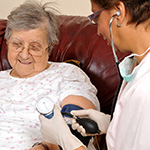
For Patients & Families
עִקַּר מִצְוַת בִּקּוּר חוֹלִים הוּא לְעַיֵן בְּצָרְכֵי הַחוֹלֶה מַה הוּא צָרִיךְ לַעֲשׂוֹת לוֹ, וְשֶׁיִמְצָא נַחַת רוּחַ עִם חֲבֵרָיו
The essential feature of the mitzvah of visiting the sick is to pay attention to the needs of patients, to see to what is necessary to be done for their benefit, and to give them the pleasure of one’s company.
Kitzur Shulchan Aruch 193:3
Many of us are reluctant to plan for life’s final phase, even though death is an inevitable part of life. Considering and communicating end-of-life choices today can improve quality of life for you and your family long into the future.
Now is the time to discuss how you want to be treated medically and cared for by your family and friends if you were to suffer a serious illness or accident. We especially encourage you and your loved ones to initiate conversations and access resources before an impending crisis emerges. This is your opportunity to contemplate your desires for how life comes to an end.
-
What Are My Options at the End of Life?
As with anything in life there are options, the same is true for the end of life. The “right” answer varies from person to person, depending on what the patient and his or her family consider makes the most sense. Some things to consider before weighing out your options are:
- Do I want to continue receiving curative treatment?
- What level of care do I need based on my illness?
- Are family and friends available to help?
- How will the cost be managed
One of the first things you get to decide is… what type care is the right one?
If you are still benefiting from curative treatment, one option is Palliative Care. Palliative care is comprehensive treatment of the pain, symptoms and stress of serious or life-limiting illness. It does not replace a patient’s primary treatment, but rather works together with the treatment they are already receiving.
If you are no longer benefiting from curative treatment, another option is Hospice. Hospice is a specialized program of care and services for you or someone you love who has a life-limiting or advanced illness. Hospice focuses on “comfort,” not curing, with special consideration and attention given to a patient’s physical, emotional and spiritual well-being. Depending on your needs and diagnosis, there are different levels of care available.
You also have the option of where to receive your care
Hospice and Palliative care services can be provided in a variety of settings to ensure the patients has access to them when and where they need them. Patients can receive hospice or palliative care in their homes, assisted living communities, nursing homes, inpatient facilities, hospice residences or in a hospital.
You have the option to decide on how your medical treatment will be provided
These are important details that can be addressed by making an Advance Care Plan. Important things like, who will make medical decisions on your behalf should you not be able to? what kind of medical treatment are you willing to accept? and what you will refuse? how do you want your pain to be managed? will you want to receive CPR?
Get started on your advanced care plan
-
End of Life: A Jewish Perspective
וַיִּקְרְבוּ יְמֵי יִשְֹרָאֵל לָמוּת
And the days drew near that Israel must die.
Genesis 47:29
Engaging hospice or palliative care services is often in line with Jewish values, regardless of how you identify along the continuum of religious observance.
Beliefs and Practices
Jewish end-of-life care programs are expert at caring for Jewish patients while acknowledging each person’s cultural beliefs and religious values. In a Jewish hospice program, such as MJHS Hospice, rabbis are available to provide counseling and caring conversations and to address end-of-life issues. A well-developed Jewish hospice program employs staff members who are sensitive to Jewish religious and cultural preferences. Your family’s religious observances will be respected. Your dietary preferences and your kitchen’s integrity will be maintained. Funeral planning can involve the Chevra Kadisha (Jewish communal burial society) and can also facilitate burial on a short timeline – often within 24 hours of the patient’s passing.
If your family system includes Holocaust survivors, look for a provider who will ensure that your family will receive gentle, loving and peaceful care from staff members who are sensitive to their past experiences. This community has extraordinarily unique needs due to the emotional, social and psychological pain experienced during the war years; these traumas often resurface during the end of life. You will want to find an educated and sensitized team of clinicians and professional caregivers who are attentive to the survivors’ past traumas, are committed to caring for Holocaust survivors with respect and compassion, and will extend this care to second and third generation survivors who have their own set of needs as caregivers.
A valuable resource for caregivers:
Jewish Hospice – For Torah/Halachah-Observant Jews
Jewish hospice providers may also provide care to other unique Jewish communities. Certain hospice providers have special programs for Jewish families observing halachah (traditional Jewish law). These programs, such as the MJHS Hospice “Halachic Pathway,” assure patients and their families that a chosen posek (rabbinic advisor) is included in the medical decision-making process. Experts in hospice understand the importance of facilitating these conversations appropriate to a person’s religious beliefs. This enables patients and their families to receive end-of-life care that adheres to their personal religious practice and to Jewish law.
-
When It’s Time to Discuss End-of-Life Care
Contemplating hospice or palliative care involves important and sometimes difficult conversations. You may wonder whether this means you are “giving up” or “taking away hope.” As a family member, you may feel inclined to limit the amount of information (diagnosis and prognosis) a patient receives or, as a patient, how much information you reveal to your family. You may have an idea of what you consider a “good death,” but worry that it won’t happen the way you envision. You may wonder whether hospice is Jewish.
If any of the above concerns have crossed your mind, you are not alone. The Center for Jewish End of Life Care enables you to learn some truths about hospice and palliative care as we reassure you that you are not alone.
Hospice and palliative care practitioners are experts in supporting patients and families in navigating the myriad factors contributing to end-of-life decisions. This support extends to those people who make up your family system – family members and friends you have taken to be your family – and involves your medical care teams and your spiritual and religious care team.
Alone or with other family members, you can write down your questions or concerns. This can often be helpful in facilitating conversations and informing clinicians about your values.
-
Making an End-of-Life Care Plan
Making and end of life care plan, or advance care planning, is the process that enables individuals to make plans about their future health care. Advance care plans provide direction to health care professionals and their family in the event that the person is not in a position to communicate their health care choices.
Ideally, advance care planning involves conversations between individuals and their family members.
The first step in Advance Care Planning is preparing your Advance Directives. Advance Directives are written legal documents spelling out the level of medical and comfort care you believe would be appropriate if you develop an advanced or terminal illness or are in a life-threatening accident. Advance directives certify these conversations and any decisions rendered; they make a record of patients’ wishes.
Advance Directives put the power in your hands to ensure your decisions are honored and fulfilled, as you’ll hear in this short TED talk: Judy MacDonald Johnston: Prepare for a Good End of Life
5 practices for planning for a good end of life. Presented at TED2013, February 2013.
Funeral Planning is often part of making an end-of-life care plan. Take a look at these Frequently Asked Questions for Funeral Homes that may help you as you navigate this part of your planning.
See the Resources and Forms/Advance Directives sections for more information.
-
Family Needs
Ask the patient, not the doctor.
Yiddish Proverb
The Center for Jewish End of Life Care connects you with information and resources you need to provide the best care for your family member. If you are the patient, you can guide your family caregivers toward the information they need, so they can support you in the way you need.
Jewish tradition offers: “It is not good for man to be alone” (Genesis 2.18). Jewish traditions across the spectrum of observance emphasize the importance of building enduring partnerships. These caregiving relationships may be with spouses, partners, parents, children, siblings and relatives. These lasting relationships may also be with people freely chosen as family.





